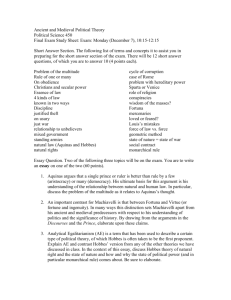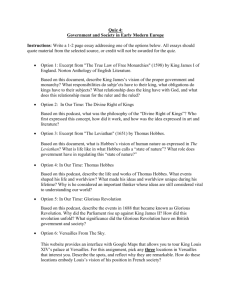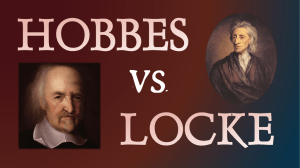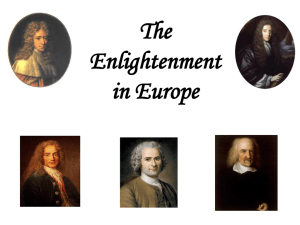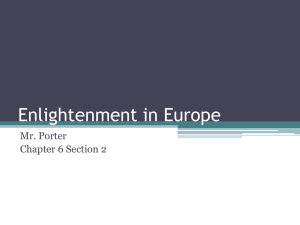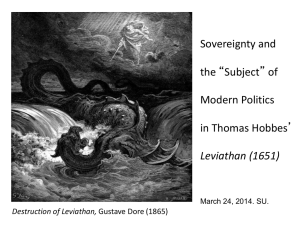PS 931: Hobbes and Political Theory (Spring 2013) - UW
advertisement
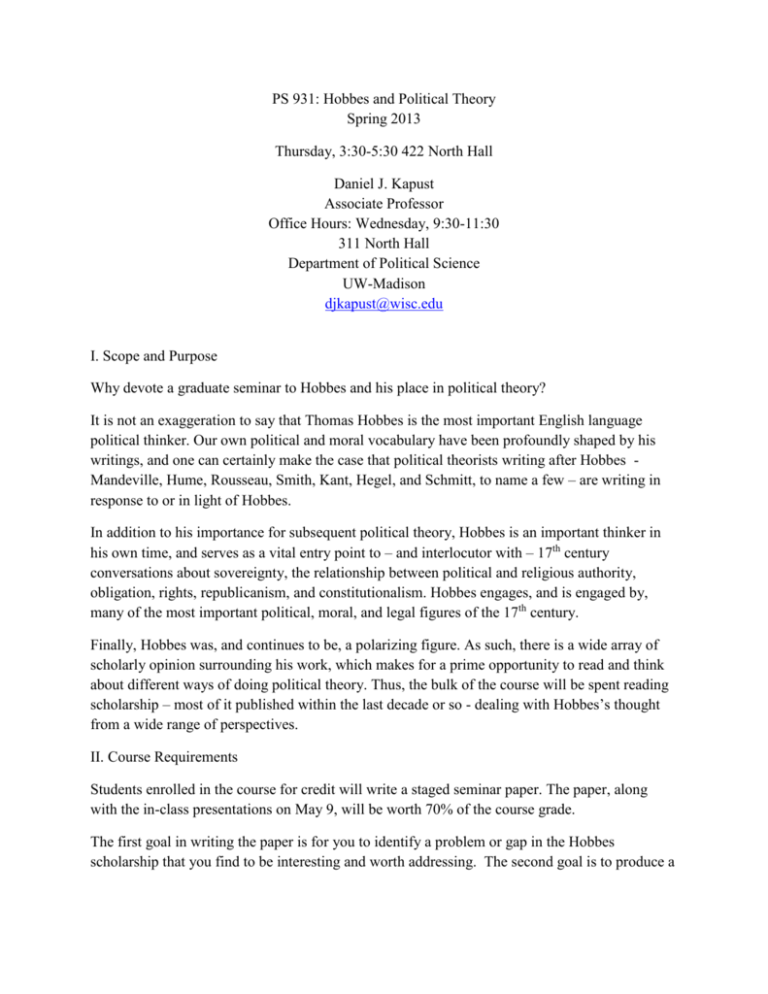
PS 931: Hobbes and Political Theory Spring 2013 Thursday, 3:30-5:30 422 North Hall Daniel J. Kapust Associate Professor Office Hours: Wednesday, 9:30-11:30 311 North Hall Department of Political Science UW-Madison djkapust@wisc.edu I. Scope and Purpose Why devote a graduate seminar to Hobbes and his place in political theory? It is not an exaggeration to say that Thomas Hobbes is the most important English language political thinker. Our own political and moral vocabulary have been profoundly shaped by his writings, and one can certainly make the case that political theorists writing after Hobbes Mandeville, Hume, Rousseau, Smith, Kant, Hegel, and Schmitt, to name a few – are writing in response to or in light of Hobbes. In addition to his importance for subsequent political theory, Hobbes is an important thinker in his own time, and serves as a vital entry point to – and interlocutor with – 17th century conversations about sovereignty, the relationship between political and religious authority, obligation, rights, republicanism, and constitutionalism. Hobbes engages, and is engaged by, many of the most important political, moral, and legal figures of the 17th century. Finally, Hobbes was, and continues to be, a polarizing figure. As such, there is a wide array of scholarly opinion surrounding his work, which makes for a prime opportunity to read and think about different ways of doing political theory. Thus, the bulk of the course will be spent reading scholarship – most of it published within the last decade or so - dealing with Hobbes’s thought from a wide range of perspectives. II. Course Requirements Students enrolled in the course for credit will write a staged seminar paper. The paper, along with the in-class presentations on May 9, will be worth 70% of the course grade. The first goal in writing the paper is for you to identify a problem or gap in the Hobbes scholarship that you find to be interesting and worth addressing. The second goal is to produce a paper that can be presented at a conference and eventually be suitable for publication. You will, in short, be preparing your own contribution to Hobbes scholarship. The paper will be broken up into 4 stages: 1. Meeting with me to discuss the topic and a preliminary bibliography. To be completed no later than Wednesday, February 27. 2. A 10-12 page literature review, to be turned in to me or placed in my departmental mailbox by Wednesday, April 3. 3. A detailed outline of the paper (3-5 pages), to be turned in to me or placed in my departmental mailbox on or before Thursday, April 11. 4. The final seminar paper (20-35 pages), to be turned in to me or placed in my departmental mailbox no later than Wednesday, May 7. You will receive a grade for the paper as a whole, and not for the individual components, each of which is designed to help you produce a stronger paper. In order to receive credit for the paper, however, you need to complete each of the components. The last day of the course will be reserved for presentations of seminar papers. You should view this as, in essence, a practice conference presentation, and will be allotted 10 minutes to present your paper. We will then have 10 minutes of class discussion of the papers. The goal of this exercise is to familiarize you with the basics of presenting at conferences, to provide further feedback on your papers, and to further enrich the mutual learning experience of the seminar by incorporating peer feedback. The paper itself should be viewed as a future conference paper, and eventual publication. In addition to the seminar paper and presentation, participation will be worth 30% of the course grade. This involves closely and carefully reading the assigned material, and participating in seminar discussion. It also requires each participant to lead discussion once during the semester. This will involve identifying an argument or passage from the day’s reading that you find to be theoretically significant, interesting, or provocative, discussing the passage and its relationship to the broader arguments or themes of the day’s reading for roughly minutes, and then presenting three issues for discussion centered on that day’s reading. Auditors will be expected to do all the readings and to lead one discussion during the semester. III. Incompletes and Academic Dishonesty Incompletes for this course will only be granted under extraordinary circumstances. Academic dishonesty will not be tolerated, and will be subject to severe penalties. IV. Texts I have ordered the following books for the course. While we will be doing additional readings, I have not ordered them because they were either out of print or cost prohibitive. Those readings (marked by an asterisk) will be available in the Graduate Reading Room of North Hall. Leo Strauss, The Political Philosophy of Hobbes: Its Basis and Its Genesis Thomas Hobbes, Leviathan, edited by Richard Tuck C.B. MacPherson, The Political Theory of Possessive Individualism Quentin Skinner, Hobbes and Republican Liberty James Martel, Subverting the Leviathan V. Recommended Readings The scholarship on Hobbes is, of course, massive, and we can barely scratch the surface in this course. My goal is to provide participants with a very basic introduction to some of the broad debates and major figures in Hobbes scholarship. Below are recommended additional readings; this list is also quite short, and far from exhaustive. A. Editions of Hobbes’s Writings The standard edition of Hobbes’s English works is the Molesworth edition. There is also a Clarendon edition. De Cive is available from Cambridge University Press, while the Elements is available from Oxford. Behemoth is available in a Clarendon edition. Malcolm has recently published a magisterial 3 volume edition of Leviathan (Oxford University Press, 2012). B. Collections/Edited Volumes This is a very small sample of recently published edited volumes and collections of essays on Hobbes. Carey, D. and Festa, L (eds). The Postcolonial Enlightenment: Eighteenth-century Colonialism and Post-Colonial Theory. Oxford: Oxford University Press. 2009. Dietz, M., (ed.), 1990, Thomas Hobbes and Political Theory, Lawrence: University of Kansas Press. Foisneau, L. and T. Sorell, (eds.), 2004, Leviathan after 350 years, Oxford: Oxford University Press. Lloyd, S.A., (ed.), 2001, “Special Issue on Recent Work on the Moral and Political Philosophy of Thomas Hobbes”, Pacific Philosophical Quarterly, 82 (3&4). Rogers, G.A.J., (ed.), 1995, Leviathan: Contemporary Responses to the Political Theory of Thomas Hobbes, Bristol: Thoemmes Press. Sorell, T. (ed.), 1996, The Cambridge Companion to Hobbes, Cambridge: Cambridge University Press. Springboard, P., (ed.), 2007, The Cambridge Companion to Hobbes's Leviathan, Cambridge: Cambridge University Press. C. Articles and Monographs This is a small and selective sample of scholarship on Hobbes. Allen, Danielle. Talking to Strangers. Chicago: University of Chicago Press. 2006. Armitage, D., 2007, “Hobbes and the foundations of modern international thought”, in Rethinking the Foundations of Modern Political Thought, Cambridge: Cambridge University Press. Ashcraft, R., 1971, “Hobbes's Natural Man: A Study in Ideology Formation”, Journal of Politics, 33: 1076-1117. Baumgold, D., 1988, Hobbes's Political Thought, Cambridge: Cambridge University Press. Collins, J., 2005, The Allegiance of Thomas Hobbes, Oxford: Oxford University Press. Curley, E., 1994, “Introduction to Hobbes's Leviathan”, Leviathan with selected variants from the Latin edition of 1668, E. Curley (ed.), Indianapolis: Indiana University Press. Curran, E., 2006, “Can Rights Curb the Hobbesian Sovereign? The Full Right to Selfpreservation, Duties of Sovereignty and the Limitations of Hohfeld”, Law and Philosophy, 25: 243-265. –––, 2007, Reclaiming the Rights of Hobbesian Subjects, Hampshire: Palgrave Macmillan. Garsten, Bryan. Saving Persuasion: A Defense of Rhetoric and Judgment. Cambridge: Harvard University Press. 2006. Gauthier, D., 1969, The Logic of 'Leviathan': the Moral and political Theory of Thomas Hobbes, Oxford: Clarendon Press. Gert, B., 1967, “Hobbes and psychological egoism”, Journal of the History of Ideas, 28: 503520. ––– 1978, “Introduction to Man and Citizen”, Man and Citizen, B. Gert, (ed.), New York: Humanities Press. ––– 1988, “The law of nature and the moral law”, Hobbes Studies, 1: 26-44. Herzog, Don. Happy Slaves. Chicago: University of Chicago Press. 1989. Hoekstra, K., 1999, “Nothing to Declare: Hobbes and the Advocate of Injustice”, Political Theory, 27 (2): 230-235. –––, 2003, “Hobbes on Law, Nature and Reason”, Journal of the History of Philosophy, 41 (1): 111-120. –––, 2007, “A lion in the house: Hobbes and democracy” in Rethinking the Foundations of Modern Political Thought, Cambridge: Cambridge University Press. ___, “Hobbesian Equality.” In S.A. Lloyd, ed., Hobbes Today. Forthcoming. Cambridge University Press. Johnston, D., 1986, The Rhetoric of'Leviathan': Thomas Hobbes and the Politics of Cultural Transformation, Princeton: Princeton University Press. Kapust, D. and Turner, B. “Democratical Gentlemen and the Lust for Mastery: Status, Ambition, and the Language of Liberty in Hobbes’s Political Thought.” Forthcoming. Political Theory. LeBuffe, M., 2003, “Hobbes on the Origin of Obligation”, British Journal for the History of Philosophy, 11(1): 15-39. Lloyd, S.A., 1992, Ideals as Interests in Hobbes's 'Leviathan': the Power of Mind over Matter, Cambridge: Cambridge University Press. Malcolm, N., 2002, Aspects of Hobbes, Oxford: Oxford University Press. Martinich, A.P., 1995, A Hobbes Dictionary, Oxford: Blackwell. –––, 1999, Hobbes: A Biography, Cambridge: Cambridg University Press. –––, 2005, Hobbes, New York: Routledge. Miller, T. Mortal Gods: Science, Politics, and the Humanist Ambitions of Thomas Hobbes. University Park: Penn State Press, 2011. Mills, C.W. The Racial Contract. Cornell: Cornell University Press, 1999. Oakeshott, M., 1975. Hobbes on Civil Association, Oxford: Oxford University Press. Pateman, C. The Sexual Contract. Stanford: Stanford University Press, 1988. Ryan, A., 1986, “A More Tolerant Hobbes?”, S. Mendus, (ed.), Justifying Toleration, Cambridge: Cambridge University Press. Skinner, Q., 1996, Reason and Rhetoric in the Philosophy of Hobbes, Cambridge: Cambridge University Press. –––, 2002, Visions of Politics Volume 3: Hobbes and Civil Science, Cambridge: Cambridge University Press. Sommerville, J., 1992, Thomas Hobbes: Political Ideas in Historical Context, London: Macmillan. Sorell, T., 1986, Hobbes, London: Routledge and Kegan Paul. Sreedhar, S. Hobbes on Resistance: Defying the Leviathan. Cambridge: Cambridge University Press, 2010. Thomas, K., “The Social Origins of Hobbes’s Political Thought,” in Hobbes Studies, ed. K. C. Brown (Cambridge: Harvard University Press, 1965), Tuck, R., 1979, Natural Rights Theories: Their Origin and Development, Cambridge: Cambridge University Press. –––, 1989, Hobbes, Oxford: Oxford University Press. –––, 1991, “Introduction”, Leviathan, R. Tuck, (ed.), Cambridge: Cambridge University Press. –––, 1993, Philosophy and Government 1572-1651, Cambridge: Cambridge University Press. Warrender, H., 1957, The Political Philosophy of Hobbes: his Theory of Obligation, Oxford: Oxford University Press. VI. Schedule of Seminars and Reading Thursday, January 24: Course Introduction Reading: Aubrey, Life of Hobbes*; Hobbes, Verse Autobiography*; Hobbes, On the Life and History of Thucydides* Thursday, January 31: Leviathan, Part I Reading: Hobbes, Leviathan (Dedicatory Letter, Introduction, and Part I) Thursday, February 7: Leviathan, Part II Reading: Hobbes, Leviathan (Part II) Thursday, February 14: Leviathan, Part III Reading: Hobbes, Leviathan (Part III) Thursday, February 21: Leviathan, Part IV Reading: Hobbes, Leviathan (Part IV) Thursday, February 28: Strauss’s Hobbes Reading: Strauss, The Political Philosophy of Hobbes: Its Basis and its Genesis Thursday, March 7: Skinner’s Hobbes Reading: Skinner, Liberty Before Liberalism Thursday, March 14: Hobbes and Religion Reading: Martinich, The Two Gods of Leviathan* Thursday, March 21: The Possessive Hobbes C.B. MacPherson, The Political Theory of Possessive Individualism Thursday, March 28: No class; Spring Break Thursday, April 4: Hobbesian Radicalism, or Radical Hobbism Reading: Martel, Subverting the Leviathan Thursday, April 11: No class; Midwest Political Science Association NOTE: I highly encourage everyone to attend, as there will be a panel on recent Hobbes scholarship featuring Al Martinich, Deborah Baumgold, Ted Miller, and Brandon Turner (my co-author and a UW-Madison PhD). There will also be at least two other panels on Hobbes, and no doubt several Hobbes papers scattered about. Thursday, April 18: Leviathan as Paper Tiger Reading: Flathman, Thomas Hobbes: Skepticism, Individuality, and Chastened Politics* Thursday, April 25: No class Thursday, May 2: Feminist Readings of Hobbes Reading: Hirschmann, Feminist Interpretations of Thomas Hobbes* Thursday, May 9: Presentations
